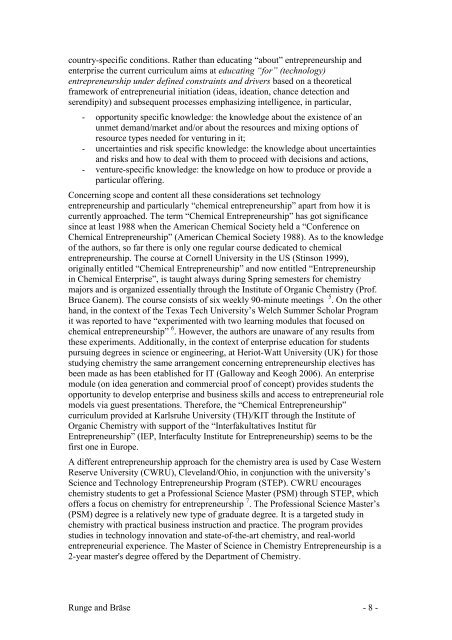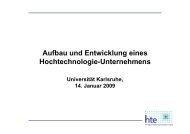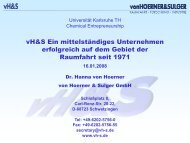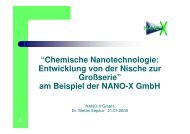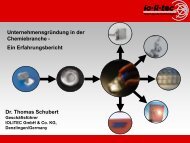Education in Chemical Entrepreneurship - KIT - Technology ...
Education in Chemical Entrepreneurship - KIT - Technology ...
Education in Chemical Entrepreneurship - KIT - Technology ...
Create successful ePaper yourself
Turn your PDF publications into a flip-book with our unique Google optimized e-Paper software.
country-specific conditions. Rather than educat<strong>in</strong>g “about” entrepreneurship and<br />
enterprise the current curriculum aims at educat<strong>in</strong>g “for” (technology)<br />
entrepreneurship under def<strong>in</strong>ed constra<strong>in</strong>ts and drivers based on a theoretical<br />
framework of entrepreneurial <strong>in</strong>itiation (ideas, ideation, chance detection and<br />
serendipity) and subsequent processes emphasiz<strong>in</strong>g <strong>in</strong>telligence, <strong>in</strong> particular,<br />
- opportunity specific knowledge: the knowledge about the existence of an<br />
unmet demand/market and/or about the resources and mix<strong>in</strong>g options of<br />
resource types needed for ventur<strong>in</strong>g <strong>in</strong> it;<br />
- uncerta<strong>in</strong>ties and risk specific knowledge: the knowledge about uncerta<strong>in</strong>ties<br />
and risks and how to deal with them to proceed with decisions and actions,<br />
- venture-specific knowledge: the knowledge on how to produce or provide a<br />
particular offer<strong>in</strong>g.<br />
Concern<strong>in</strong>g scope and content all these considerations set technology<br />
entrepreneurship and particularly “chemical entrepreneurship” apart from how it is<br />
currently approached. The term “<strong>Chemical</strong> <strong>Entrepreneurship</strong>” has got significance<br />
s<strong>in</strong>ce at least 1988 when the American <strong>Chemical</strong> Society held a “Conference on<br />
<strong>Chemical</strong> <strong>Entrepreneurship</strong>” (American <strong>Chemical</strong> Society 1988). As to the knowledge<br />
of the authors, so far there is only one regular course dedicated to chemical<br />
entrepreneurship. The course at Cornell University <strong>in</strong> the US (St<strong>in</strong>son 1999),<br />
orig<strong>in</strong>ally entitled “<strong>Chemical</strong> <strong>Entrepreneurship</strong>” and now entitled “<strong>Entrepreneurship</strong><br />
<strong>in</strong> <strong>Chemical</strong> Enterprise”, is taught always dur<strong>in</strong>g Spr<strong>in</strong>g semesters for chemistry<br />
majors and is organized essentially through the Institute of Organic Chemistry (Prof.<br />
Bruce Ganem). The course consists of six weekly 90-m<strong>in</strong>ute meet<strong>in</strong>gs 5 . On the other<br />
hand, <strong>in</strong> the context of the Texas Tech University’s Welch Summer Scholar Program<br />
it was reported to have “experimented with two learn<strong>in</strong>g modules that focused on<br />
chemical entrepreneurship” 6 . However, the authors are unaware of any results from<br />
these experiments. Additionally, <strong>in</strong> the context of enterprise education for students<br />
pursu<strong>in</strong>g degrees <strong>in</strong> science or eng<strong>in</strong>eer<strong>in</strong>g, at Heriot-Watt University (UK) for those<br />
study<strong>in</strong>g chemistry the same arrangement concern<strong>in</strong>g entrepreneurship electives has<br />
been made as has been etablished for IT (Galloway and Keogh 2006). An enterprise<br />
module (on idea generation and commercial proof of concept) provides students the<br />
opportunity to develop enterprise and bus<strong>in</strong>ess skills and access to entrepreneurial role<br />
models via guest presentations. Therefore, the “<strong>Chemical</strong> <strong>Entrepreneurship</strong>”<br />
curriculum provided at Karlsruhe University (TH)/<strong>KIT</strong> through the Institute of<br />
Organic Chemistry with support of the “Interfakultatives Institut für<br />
<strong>Entrepreneurship</strong>” (IEP, Interfaculty Institute for <strong>Entrepreneurship</strong>) seems to be the<br />
first one <strong>in</strong> Europe.<br />
A different entrepreneurship approach for the chemistry area is used by Case Western<br />
Reserve University (CWRU), Cleveland/Ohio, <strong>in</strong> conjunction with the university’s<br />
Science and <strong>Technology</strong> <strong>Entrepreneurship</strong> Program (STEP). CWRU encourages<br />
chemistry students to get a Professional Science Master (PSM) through STEP, which<br />
offers a focus on chemistry for entrepreneurship 7 . The Professional Science Master’s<br />
(PSM) degree is a relatively new type of graduate degree. It is a targeted study <strong>in</strong><br />
chemistry with practical bus<strong>in</strong>ess <strong>in</strong>struction and practice. The program provides<br />
studies <strong>in</strong> technology <strong>in</strong>novation and state-of-the-art chemistry, and real-world<br />
entrepreneurial experience. The Master of Science <strong>in</strong> Chemistry <strong>Entrepreneurship</strong> is a<br />
2-year master's degree offered by the Department of Chemistry.<br />
Runge and Bräse - 8 -


